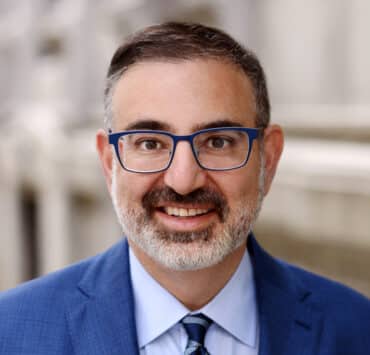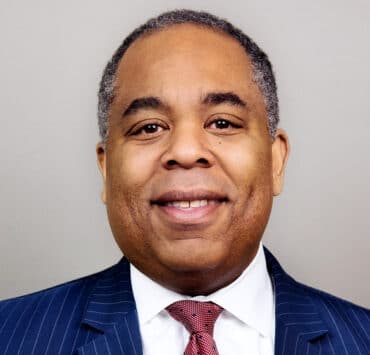|
Getting your Trinity Audio player ready...
|
Although Sonia Banerji had lawyers in her family, she originally planned to take a different path. “I majored in history and economics at the University of Richmond and had been considering the idea of getting my PhD in history. But I wasn’t sure that a career in academia would really suit me,” she says. She hedged her bets by applying to both doctoral programs and law schools.
“Law seemed a good alternative choice,” she explains. “My best talents include reading, researching, assembling evidence, and crafting arguments. And I was attracted to the idea of using those talents to influence and persuade clients—especially in terms that nonlawyer clients could readily understand. I also knew I could keep a cool head under pressure, which turns out is something that clients appreciate in their lawyer.”
Ultimately, she chose law and received her JD from Harvard Law in 1998.

She kicked off her career with a six-year stay at the firm Heller Ehrman (which later dissolved during the financial crisis but was then one of the West Coast’s premier firms). “Joining a major firm was a common trajectory for Harvard Law graduates,” Banerji says. “I wanted lively and engaging work, and big firms offer more options. Employment law involves events between human beings in the workplace—and I found that more attractive than contract law and other less colorful areas.”
Banerji worked with experienced lawyers and top-tier clients; the firm represented Bank of America, Genentech, Visa, and other household names. “It was my first exposure to litigation, and I quickly learned the nuts and bolts of defending an employment case,” she says.
In late 2004, Banerji joined Morgan Stanley as its in-house West Coast employment attorney—her first in-house role—focusing on managing employment arbitrations and class action litigation as well as providing employment legal advice in the securities industry. “They were often high-stakes cases, and I gained invaluable experience there,” she says. “I also learned that in-house attorneys add value when they understand the specific priorities and legal challenges that a business faces.”
She spent nearly fifteen years with Morgan Stanley, but in 2019 a former colleague who had moved to PayPal told Banerji about an irresistible opportunity. “I had the chance to build and manage a global team, which would help take my career to the next level,” she says. “I’d already had plenty of financial-industry experience, and I saw PayPal as being similar, yet a distinct and new challenge.”
As the company’s global head of employment law, Banerji advises senior stakeholders in HR matters, guides teams conducting internal investigations, manages major litigation, assists with due diligence in M&A matters, and supervises and leads PayPal’s team of domestic and international employment lawyers.
Her employment legal team includes two attorneys and two senior paralegals for the Americas, in addition to about a half-dozen lawyers covering Europe, India, the Middle East, and the Asia-Pacific region. Additionally, within her remit is a global workplace investigations team that reviews serious workplace infractions such as allegations of discrimination, harassment, and retaliation.
Banerji’s team staffs key locations around the world, including Luxembourg, the UK, and Singapore, to cover employment law issues in the approximately twenty-six countries where the company has employees. “That means we must be conversant not just in local practices, but entire regions as well,” she says.
“When you feel financially secure, it benefits your physical, mental, and emotional well-being.”
Adhering to laws and customs that vary dramatically by country is something of a balancing act. Countries often have differing approaches to work-related concepts, but PayPal needs to maintain a consistent baseline in employee conduct, discipline, and other factors. “That’s why my global team is so valuable,” she says. “They are my trusted advisors, and they’re masterful enough to handle many situations independently—but I still provide advice and guidance as needed.”
Because financial transactions are PayPal’s lifeblood, and wellness one of its core values, it’s fitting that the company has rolled out initiatives to promote employees’ financial wellness. Banerji’s team helps to vet these for legal compliance. “For example, employees can use an app that enables them to essentially get an advance on their paychecks but without incurring additional expenses or interest,” she explains. “And when you feel financially secure, it benefits your physical, mental, and emotional well-being.”
The COVID-19 pandemic added another layer to Banerji’s responsibilities. “It’s been a crazy sixteen months,” she says. “We confronted all sorts of new questions and procedures—how do we move a population of employees to work-from-home status? What must we do to be legally compliant?”
She notes that the company had essential employees, such as facilities management, IT, and security, who couldn’t work from home. “We had to stay on top of rules regarding exposure cases, quarantine regulations, government reports, and so on,” she says. “We just had to figure out the proper questions and then develop the answers.”
Her approach to finding those answers is good advice for anyone sailing in uncharted waters.
“Remember what you know! If you’ve never encountered the situation before, consider something that was similar to it,” Banerji advises. “Have confidence in your own judgment, but always be willing to call upon your subject-matter experts. Consult with your other team members, and then come to a conclusion.”
***
Greenberg Traurig:
“Sonia is a brilliant and dedicated lawyer who always impresses with her ability to find practical solutions to the most complex problems. Unflappable in the trenches, Sonia is also an absolute pleasure to work with.”
–Tracy Gerber, Shareholder


